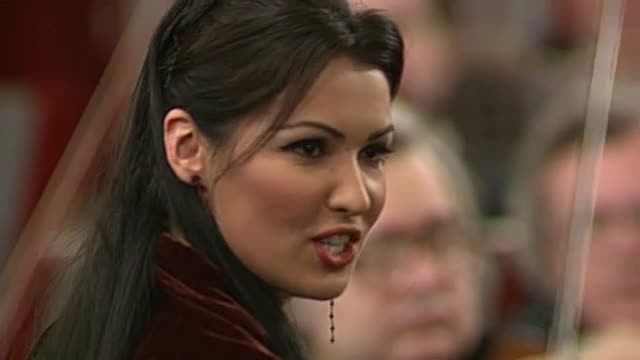Boris Schwartz, in his 1983 book Great Masters of the Violin, draws attention to the ‘unruffled perfection’ of Victor Tretyakov’s public performances, although Harold Schonberg found that he ‘seldom displayed an outburst of temperament or individuality’. Both comments become less pertinent, however, with hindsight: Tretyakov almost epitomises Soviet string playing of the period and this is not a style heard much today. From a twenty-first-century perspective there is something rather forbidding in his sound, with its search for ultimate power and tonal authority; yet at the same time there is an unmistakeable communicative directness and confidence. Tretyakov certainly stands comparison with other greats of the Soviet era (David Oistrakh, Kogan…) in this respect, and performs Shostakovich’s Concerto No. 1 (live, 1981) with the kind of vividness that might be expected of such a player. His live 1979 Brahms Concerto is notably rich and powerful, with an especially intense first movement. The slow movement is very slow however and sounds rather bloated, an impression furthered by some old-fashioned orchestral playing suggestive of Karajan’s monumental approach. Surprisingly effective is his 1989 Vivaldi ‘La primavera’. One might expect the light textures to be treated more heavily, but in fact this is a fine performance (under Tretyakov’s own direction) in the mainstream mould, with a haunting slow movement. His Saint-Saëns Introduction et Rondo capriccioso (from the same recording) and indeed Beethoven’s Op. 12 No. 1 (live, 1967) are perhaps more of an acquired taste. The Saint-Saëns is powerful to the extent of harshness at times, with a massive-scale approach; the Beethoven is certainly lively, clear and strongly articulated, but there is a lot of fast vibrato and Tretyakov admits no portamento or tempo flexibility to soften the edges – a rather iron-fisted impression, overall, of this early Beethoven work.
Tretyakov’s sound is thus very much of its time and place. His modernist tendencies show in the more or less constant, tightly-wound vibrato; there are very few audible position changes; and musical nuances are conveyed, largely, by dynamics and expressive slowing at phrase endings. It is tonal strength and a certain bitter-sweet intensity that allows him to sing the tragic slow movement of the Shostakovich Concerto (live, 1981) so successfully, however, and this movement alone conveys much of Tretyakov’s idiomatic voice.
© Naxos Rights International Ltd. — David Milsom (A–Z of String Players, Naxos 8.558081-84)
| Title | |
| GALA FROM ST. PETERSBURG | |

|
GALA FROM ST. PETERSBURG
Composers:
Bruch, Max -- Donizetti, Gaetano -- Leoncavallo, Ruggero -- Puccini, Giacomo -- Rachmaninov, Sergei -- Ravel, Maurice -- Respighi, Ottorino -- Saint-Saens, Camille -- Shostakovich, Dmitry -- Tchaikovsky, Pyotr Il'yich -- Verdi, Giuseppe
Artists:
Alekseev, Nikolai -- Hvorostovsky, Dmitri -- Maisky, Mischa -- Netrebko, Anna -- St. Petersburg Philharmonic Orchestra -- Temirkanov, Yuri -- Tretyakov, Victor -- Virsaladze, Elisso
Label/Producer: EuroArts |
